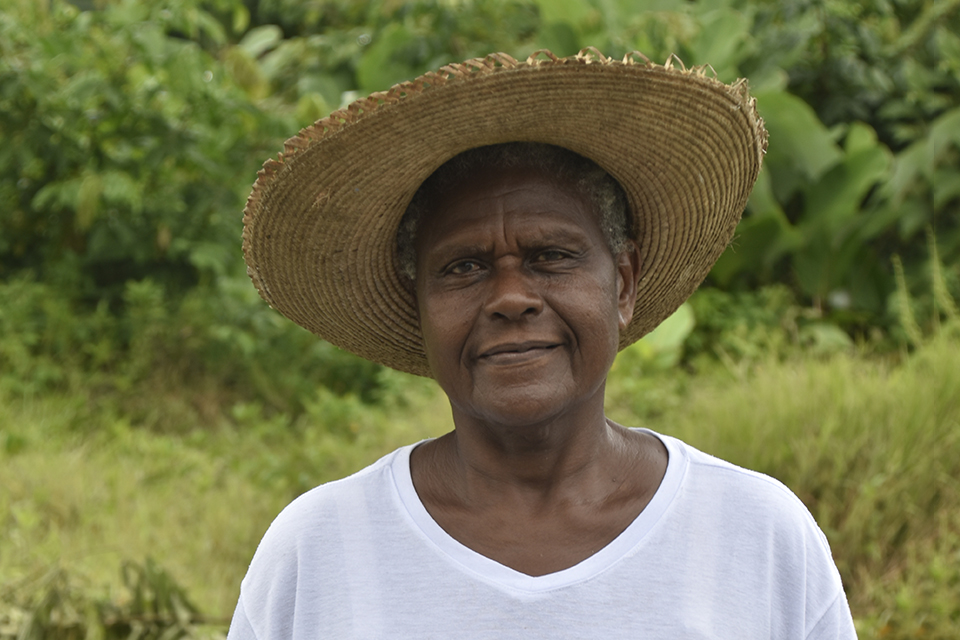Women in leadership: Marcelina Solis, midwife and traditional doctor in Colombia, at the service of the response in times of COVID-19.
Marcelina has lost count of how many babies she has helped to deliver. In the time of COVID-19, she attended the births of women who could not access health services.Date:

"What I do remember well is that the first birth I attended was that of a beautiful baby girl who is now 42 years old," says Marcelina Solís Rodríguez, midwife and traditional Colombian doctor.
Generation after generation, the isolated populations in the Colombian Pacific, where inequality gaps lurk on a daily basis, have made midwifery and traditional medicine one of the most recognized and important jobs for the Afro-descendant communities that inhabit this territory.
At 67 years of age, Marcelina says in a calm voice that she has lost count of how many children she has helped bring into the world. She has been doing this for over 40 years.
Midwifery in this region is an ancestral legacy. It is considered a gift that keeps their culture and identity alive. After a long struggle for recognition and inclusion of the traditional practice, midwifery was declared a part of the Nation’s Intangible Cultural Heritage.
Today, the General Health System in Colombia recognizes traditional midwifery as an indispensable ally for the care of pregnant women who do not have easy access to hospitals, and establishes strategies for education and training to improve the practice.
Women coming together through the Chiyangua Foundation
In 2011, armed violence banished many inhabitants, including Marcelina, her two daughters and her son, from the village of Santa Clara, a community in Alto Guapi on the Pacific Coast of the department of Cauca, where she is from.
She says that her territory was invaded little by little by strangers (illegal armed groups).Displaced and with her family on her shoulders, she arrived in the municipality of Guapi, which has welcomed her all these years.
There she met the Chiyangua Foundation, a grassroot rganization that works for the leadership and effective participation of women in the territory, and from this organizational space she now leads processes related to traditional medicine and midwifery.
During the COVID-19 pandemic, violence and risks for midwives have gotten a lot worse. The challenge seems to have tripled: isolation, lack of specialized care in healthcare centers, and the risk of contagion are some of the concerns they have had to face.
"It has been very hard because the pandemic has isolated us even more and even so we have had to attend many deliveries in the midst of the anxiety caused by the contagion," says Marcelina.
Witnesses of a conflict that has begun to worsen in many parts of the country, survivors of other pandemics, the midwives, through their knowledge and skills, have managed to mitigate the mental and physical impact on pregnant women and newborns in these difficult contexts. Even in many corners of Colombia, these brave women are still working quietly and tirelessly in the front line of response.
Strengthening ancestral practices
Marcelina is part of the project 'Empowerment of the Women of the Caucan Pacific for the Mobilization and Promotion of Community Communication Strategies for the Prevention of COVID-19 and the rescue of ancestral practices', led by the Chiyangua Foundation with the support of UN Women and the Fund for Women, Peace and Humanitarian Action of the United States Agency for Development, which has been an opportunity in the midst of so much adversity for the women of this territory.
The work articulated in this project has allowed the consolidation of women's leadership through the appropriation of knowledge and skills in order to disseminate and raise awareness on issues of prevention of COVID-19, gender-based violence and care work that falls mostly on women.
Marcelina, acknowledeges that the project has strengthened her ancestral practice enabling her to continue sharing knowledge with future generations.
"The project has allowed us to work with and for the black women of my territory, because it is important to carry on this legacy, which invites us to work with our medicinal plants and to disseminate our ancestral knowledge," says Marcelina.